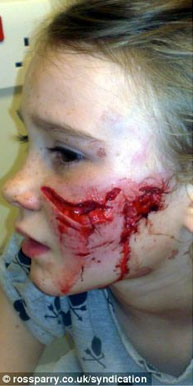CWU Bite-Back Campaign Victory As Amended Dangerous Dogs Act Northern-Ireland Becomes Law
Dave Joyce, CWU National Health, Safety & Environment Officer expressed his pleasure at being able to announce that the new Dogs (Amendment) Act (Northern-Ireland) 2011 has come into operation. This Act passed its final stage in the Northern Ireland Assembly on the 8th February and received Royal Assent on March 8th 2011. The Northern Ireland Assembly have decided that different sections of the new Act will commence at different dates as determined by NI Government.
 In his letter to branches, LTB704/11, Dave Joyce provides full details of the new law and how it will operate: In his letter to branches, LTB704/11, Dave Joyce provides full details of the new law and how it will operate:
"As Branches know only too well, around 5000 to 6000 Postal workers are attacked by dogs every year in the UK whilst delivering the Mail. 70% of which occur on private land or premises. Additionally, around 400 BT Engineers get bitten annually also. Many members require hospital treatment and many receive serious injuries. Two Postal workers (one in 2007 and one in 2008) were nearly killed in savage attacks. For these reasons the CWU "Bite-Back" Campaign was launched in early 2008.
The new Northern Ireland legislation, (as with the new Scottish Dangerous Dogs legislation, reported to Branches previously in LTB 221/11 on 8 March 2011), will apply everywhere, including private property and will give Police, Councils and Courts greater powers to impose penalties on the owners of dangerous dogs. The legislation modernises the existing "piecemeal" ineffective legislation in Northern Ireland (The Dogs (Northern Ireland) Order 1983, The Dangerous Dogs (Northern Ireland) Order 1991, The Dogs (Amendment) Act (Northern Ireland) 2001) on dogs.
The Dogs (Amendment) Act (Northern Ireland) 2011, places a sharper focus and responsible dog ownership and the control of dangerous or out of control dogs with more legal responsibility placed on the owners of badly behaved dogs.
This new Act importantly places the onus on the owners, not the dogs, to ensure they are properly controlled. The key message is that any dog can show aggression, particularly if it is not handled and trained properly, so legislation that
provides the tools to target irresponsible ownership before it becomes a problem is very welcome. The owners of dogs who attack people, livestock and other people’s pets, face new substantial penalties, and the new powers will help Council Dog Wardens and Police enforce the law. The new Act sends out the clear message that casual and careless dog ownership is not acceptable in Northern Ireland.
LTB704/11 goes into detail of the history of the campaign in Northern Ireland and the timescale for implementation of the Act. There is also some detail as to the penalties that will be paid by dangerous dog owners:
- Dog’s behaviour is aggressive or threatening is punishable by up to six months imprisonment and a fine of £5,000.
- Dog injures a person attacked, punishable by up six months imprisonment and a £5,000 fine at the Magistrates Court or up to two years imprisonment and an unlimited fine at the Crown Court.
- Dog worries, chases, causes suffering to livestock or a financial loss to their owner - punishable by a fine of up to £1,000.
- Dog attacks and injures another person’s Dog or other pet - fine of up to £1,000.
 Dog deliberately set on livestock or another person’s Dog or pet - fine of up to £2,500. Dog deliberately set on livestock or another person’s Dog or pet - fine of up to £2,500.
- Keeping a dog without a valid licence may result in a warning, a formal caution, a fixed penalty (£75) or prosecution and a fine of up to £1,000.
- Failure to ensure that a dog wears the appropriate collar identification is an offence which could result in a maximum fine of £1,000.
- Failure to ensure that a dog has been microchipped is an offence which could result in a maximum fine of £1,000
- Contravention of Dog Control Notice, Licence conditions - fine of up to £2,500.
- If a dog strays and is seized by a council dog warden the owner may be issued with a warning, a caution or a fixed penalty fine (£75). The owner may even be prosecuted and fined up to £1,000.
- Owning, breeding, selling or making a gift of a dog of a banned type - up to six months’ imprisonment and a fine of £5,000 and in most cases, the court will order the dog be destroyed.
- Fixed penalties - Certain offences attract a 'Fixed Penalty Notice' (£75), as well as other sanctions, as an alternative to prosecution. A dog warden may therefore offer the opportunity of discharging liability for the offence through payment of a fixed penalty as an alternative to having the matter dealt with in court.
The offences which can attract a fixed penalty are: (a) keeping a dog without a licence, (b) straying, (c) failing to keep a dog under control on
certain roads and where livestock is present, (d) failing to display identification information on a collar/tag.
- Finally, if a Dog has attacked a Person, another person's pet or worried livestock a court may order that the Dog be destroyed and may order that the offender is disqualified from owning a Dog.
The full LTB contains several attachments:
- Copy of the Dogs (Amendment) Act (Northern-Ireland) 2011
- Copy of The Dogs (Northern Ireland) Order 1983
- Copy of The Dogs (Amendment) (2011 Act) (Commencement No.1) Order (Northern Ireland) 2011
- Copy of The Northern Ireland Assembly - Dept of Agriculture & Rural Development, Guidance for members of the public "Controlling your dog in public"
You can download the full LTB704/11 from the E-Library Database by selecting category 'Dangerous Dogs NI'
Source: CWU
|


 In his letter to branches, LTB704/11, Dave Joyce provides full details of the new law and how it will operate:
In his letter to branches, LTB704/11, Dave Joyce provides full details of the new law and how it will operate: Dog deliberately set on livestock or another person’s Dog or pet - fine of up to £2,500.
Dog deliberately set on livestock or another person’s Dog or pet - fine of up to £2,500.